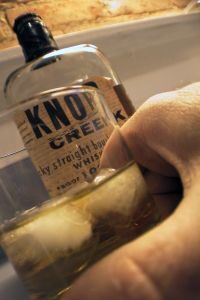Physical Address
304 North Cardinal St.
Dorchester Center, MA 02124
Physical Address
304 North Cardinal St.
Dorchester Center, MA 02124
[amazonify]0976247909:right[/amazonify]Two books that I have recently read deserve attention today. One is My Way Out and the other is The Cure for Alcoholism. Both are great books and both detail a pharmacological cure for alcoholism. I know that if you are someone who suffers from alcoholism or some other form of addiction, you’ll be skeptical at the whole notion of cure. For decades Alcoholics Anonymous has been advising there is no cure while preaching a powerful abstinence that just doesn’t seem to work for most people unless it is reinforced by constant monitoring and control. Traditional pharmacological therapies have been equally ineffective, helping a few but leaving most out in the cold.
These books are both different. You may be surprised to learn that neither of the books require (or even advise) total abstinence from alcohol, and both strip out the heavy duty demonization and moralization that often goes a long with this disease (like you are someone weak and deficient because you are an alcoholic). Instead they advise, in an open and sensible manner free of the prohibition like frenzy that often surrounds this social problem, change in diet, lifestyle, and attention to whatever social or emotional pathologies may encourage addictive behavior. Recognizing that alcohol, like other addictive substances, provides an endorphin rush (i.e. they make your brain feel good), the books develop treatment strategies that deal with that. Treatment involves a pharmacological intervention that interferes with the uptake of endorphins in the brain (thus robbing you of the feel good properties of alcohol) and dramatically reducing craving over time. The book authors claim success rates as high as 80% which is incredible considering how difficult addictions are to treat. I haven’t seen these treatments in action yet, though I do have a client who I’m hoping will try them out. They do, however, seem highly promising, and they are backed by serious scientific research.
 Now as a sociologist I usually don’t buy into biological or genetic explanations of anything. For me traditional psychology has too narrow a focus and it misses a lot of key causal factors when it approaches psychological dysfunction. I understand the power that advertising, the media, and our social groups have to determine our behavior and personality so from my sociologically sophisticated perspective, even something as “genetic” as IQ isn’t really genetic at all, but social. Still, what I found most interesting about the books from a sociological point of view was the emphasis on the relationship between alcohol and endorphins, a biological process. Endorphins of course are the natural “feel good” drugs in your brain. Similar to morphine, the body releases endorphins in responses to both positive and negative stimuli. Stress and pain cause endorphin release, but also laughter and orgasm. In addition, long distance running has long been associated with endorphin release (the so called “runner’s high”). Endorphins are the body’s “feel good” system and lack of endorphins may lead to depression. Drinking alcohol is a way to encourage endorphin release in the brain.
Now as a sociologist I usually don’t buy into biological or genetic explanations of anything. For me traditional psychology has too narrow a focus and it misses a lot of key causal factors when it approaches psychological dysfunction. I understand the power that advertising, the media, and our social groups have to determine our behavior and personality so from my sociologically sophisticated perspective, even something as “genetic” as IQ isn’t really genetic at all, but social. Still, what I found most interesting about the books from a sociological point of view was the emphasis on the relationship between alcohol and endorphins, a biological process. Endorphins of course are the natural “feel good” drugs in your brain. Similar to morphine, the body releases endorphins in responses to both positive and negative stimuli. Stress and pain cause endorphin release, but also laughter and orgasm. In addition, long distance running has long been associated with endorphin release (the so called “runner’s high”). Endorphins are the body’s “feel good” system and lack of endorphins may lead to depression. Drinking alcohol is a way to encourage endorphin release in the brain.
But why do you need alcohol to encourage endorphin release if it is released by other activities?
[amazonify]1933771550:right[/amazonify]Well, probably because you don’t feel good about things. I have a client, an alcoholic, who is embedded in an extremely toxic family environment. His wife yells and screams and judges, his children are dealing with the effects of long term psychological, emotional, and physical abuse, he is struggling in his business, and he turns to alcohol to help him cope–and we can see why that would work. Because of the stressful environment he lives in, his body is not releasing enough endorphins to keep him feeling good and so he is encouraging additional release through the abuse of alcohol. It’s a bad habit to get into of course because once your brain builds the chemical association between endorphin release and a shot of the Knob Creek, the addiction is extremely hard to break. Of course, nobody can survive when they are made to feel like dirt all the time.
So what are you going to do about this? Well, if there is an addiction present the implications are clear, you have to break the chemical association and change your environment so your body is not so overwhelmed that it needs additional medication. We now know how to break the chemical association in the brain (both books reviewed here provide a solution). The harder part is cleaning up our social environments; but at least now you know where to start looking.
![]() Tweet This Post
Tweet This Post
Related posts:
Posted by Dr. Michael Sosteric on February 19, 2010.
Tags: addictive behavior, addictive substances, alchoholism, endorphin rush, endorphins, pathologies, pharmacological intervention, pharmacological therapies, properties of alcohol, treatment strategies
Categories: Book Reviews, Featured Articles, Michael Sosteric